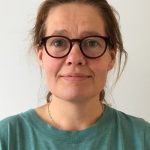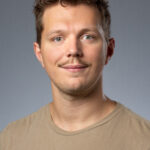Programme
The Danish Network for Cultural Memory Studies is a collaboration between scholars from primarily Copenhagen University and Aarhus University. It is a continuation of a network at Aarhus University founded in 2008 comprising scholars from Aesthetics, Scandinavian studies, Anthropology, and History. The central focus of the network is the aesthetics and practices of memory cultures and works of art. Approximately 15 faculty members and 15 graduate students are part of the network.
Contacts
 Sara Dybris McQuaid is an Associate Professor at Aarhus University. She is a contemporary historian and political scientist who works mostly across the interdisciplinary fields of peace and conflict studies and memory studies. Her research pivots around how collectives remember, forget, and archive their past, particularly as part of conflict and peace-building processes, and she has published extensively on this in the context of the “post-conflict” peace process in Northern Ireland. She is currently working on dynamics of “multi-level memory governance” in transnational “Administrations of Memory”. Her recent publications include “Politics and Narrative in Ireland’s Decade of Commemorations” (co-editor Fearghal McGarry, 2022) and “Administrations of Memory: Transcending the Nation and Bringing Back the State in Memory Studies” (co-editor Sarah Gensburger [2019] 2022). She teaches in the English Degree Programme, the BA in Humanities and Conflict, and the MA in Intercultural Studies at Aarhus University. She is a founding member of the research collective Centre for Resolution of International Conflicts at the University of Copenhagen, and she is on the MC of the COST Action “Slow Memory: Transformative Practices for Times of Uneven and Accelerating Change”, where she also co-directs the working group “Transformation of Conflict”.
Sara Dybris McQuaid is an Associate Professor at Aarhus University. She is a contemporary historian and political scientist who works mostly across the interdisciplinary fields of peace and conflict studies and memory studies. Her research pivots around how collectives remember, forget, and archive their past, particularly as part of conflict and peace-building processes, and she has published extensively on this in the context of the “post-conflict” peace process in Northern Ireland. She is currently working on dynamics of “multi-level memory governance” in transnational “Administrations of Memory”. Her recent publications include “Politics and Narrative in Ireland’s Decade of Commemorations” (co-editor Fearghal McGarry, 2022) and “Administrations of Memory: Transcending the Nation and Bringing Back the State in Memory Studies” (co-editor Sarah Gensburger [2019] 2022). She teaches in the English Degree Programme, the BA in Humanities and Conflict, and the MA in Intercultural Studies at Aarhus University. She is a founding member of the research collective Centre for Resolution of International Conflicts at the University of Copenhagen, and she is on the MC of the COST Action “Slow Memory: Transformative Practices for Times of Uneven and Accelerating Change”, where she also co-directs the working group “Transformation of Conflict”.
 Jessica Ortner is a postdoc at the University of Copenhagen and currently holds a grant from the Danish Council of Independent Research. Ortner examines the impact of art and literature on cultural memory as well as the developments of German and European memory culture from 1945 until today. She is specialized in German-language Holocaust literature written by the second and third generations, reconstructions of the 20th century’s atrocities in contemporary Eastern-European migrant literature, and political usages of Europe’s traumatic histories. Working with the concepts of traveling memories, transnationalism, and postmemory, Ortner examines the extent to which the present family novel develops in relation to, or across, national boundaries. She obtained her PhD degree with a thesis on the Austrian writer Elfriede Jelinek, focusing on Jelinek’s literary strategies of representing the Shoah and broaching Austria’s national socialist past. Recent publications include “Multidirectional Literature as Subversion: Transcultural Tendencies in German Jewish Literature after 1990” (2017, in print), “Diaspora, Postmemory, and the Transcultural Turn in Contemporary Jewish Writing” (2015), “Magical Realism in the Holocaust Literature of the Postwar Generations” (2014), and the monograph Poetologie “nach Auschwitz”: Narratologie, Semantik und sekundäre Zeugenschaft in Elfriede Jelineks Roman “Die Kinder der Toten” (2016).
Jessica Ortner is a postdoc at the University of Copenhagen and currently holds a grant from the Danish Council of Independent Research. Ortner examines the impact of art and literature on cultural memory as well as the developments of German and European memory culture from 1945 until today. She is specialized in German-language Holocaust literature written by the second and third generations, reconstructions of the 20th century’s atrocities in contemporary Eastern-European migrant literature, and political usages of Europe’s traumatic histories. Working with the concepts of traveling memories, transnationalism, and postmemory, Ortner examines the extent to which the present family novel develops in relation to, or across, national boundaries. She obtained her PhD degree with a thesis on the Austrian writer Elfriede Jelinek, focusing on Jelinek’s literary strategies of representing the Shoah and broaching Austria’s national socialist past. Recent publications include “Multidirectional Literature as Subversion: Transcultural Tendencies in German Jewish Literature after 1990” (2017, in print), “Diaspora, Postmemory, and the Transcultural Turn in Contemporary Jewish Writing” (2015), “Magical Realism in the Holocaust Literature of the Postwar Generations” (2014), and the monograph Poetologie “nach Auschwitz”: Narratologie, Semantik und sekundäre Zeugenschaft in Elfriede Jelineks Roman “Die Kinder der Toten” (2016).
 Tea Sindbæk Andersen teaches East European Studies at the Department of Cross-Cultural and Regional Studies, University of Copenhagen. Tea’s research focuses on the contemporary history of Southeastern Europe, especially on issues related to cultural memory, uses of history, identity politics and popular culture in the Yugoslav area. 2012 – 2016, she was vice-chair of the European research network In Search of Transcultural Memory in Europe funded by EU/COST. Tea is a member of the executive committee of the Memory Studies Association (MSA) and co-hosted the MSA annual conference in Copenhagen, December 2017. With Jessica Ortner, she co-edited the special issue ‘Memories of Joy’, Memory Studies 2019 (vol. 12: 1). She is the author of Usable History? Representations of Yugoslavia’s difficult past from 1945 to 2002 (Aarhus University Press 2012) and, with Barbara Törnquist-Plewa, co-editor of Disputed Memory. Emotions and memory politics in Central, Eastern and South-eastern Europe (De Gruyter 2016) and The Twentieth Century in European Memory: Transcultural Mediation and Reception (Brill 2018).
Tea Sindbæk Andersen teaches East European Studies at the Department of Cross-Cultural and Regional Studies, University of Copenhagen. Tea’s research focuses on the contemporary history of Southeastern Europe, especially on issues related to cultural memory, uses of history, identity politics and popular culture in the Yugoslav area. 2012 – 2016, she was vice-chair of the European research network In Search of Transcultural Memory in Europe funded by EU/COST. Tea is a member of the executive committee of the Memory Studies Association (MSA) and co-hosted the MSA annual conference in Copenhagen, December 2017. With Jessica Ortner, she co-edited the special issue ‘Memories of Joy’, Memory Studies 2019 (vol. 12: 1). She is the author of Usable History? Representations of Yugoslavia’s difficult past from 1945 to 2002 (Aarhus University Press 2012) and, with Barbara Törnquist-Plewa, co-editor of Disputed Memory. Emotions and memory politics in Central, Eastern and South-eastern Europe (De Gruyter 2016) and The Twentieth Century in European Memory: Transcultural Mediation and Reception (Brill 2018).
 Alexander Ulrich Thygesen is an Assistant Professor of Spanish and Latin American Studies at Aarhus University. His current research focuses on the interconnections between memory and activism during the 2019 Chilean mass mobilization and the constitutional process it sparked. Thygesen has a particular interest in activists’ aesthetic reconfigurations of urban spaces and the way these practices relate to processes of political subjectivation in moments of unrest. In connection with this research, he also works with digital methodologies for analysing large-scale social media data within a memory studies framework. His recent publications include “Remembering through Guerrilla Gardening: The Garden of Resistance in Santiago de Chile” (2025) in The Palgrave Encyclopedia of Cultural Heritage and Conflict, edited by Ihab Saloul and Britt Baillie; “Contentious Memories of a Riot Dog: The Matapacos Statue Intervention during the 2019/2020 Social Uprising in Chile” (2024) in Memory Studies; and “Digital Methods in Memory Studies: A Beginner’s Guide to Scalable Reading of Twitter Data” (2024) in Memory Studies, co-authored with H. S. Jensen, J. M. Jensen, and M. O. Pedersen. Thygesen serves on the steering committee of the UPAST Memory and Heritage Centre at Aarhus University and is co-chair of the Memory Studies Association’s Memory and Activism Working Group.
Alexander Ulrich Thygesen is an Assistant Professor of Spanish and Latin American Studies at Aarhus University. His current research focuses on the interconnections between memory and activism during the 2019 Chilean mass mobilization and the constitutional process it sparked. Thygesen has a particular interest in activists’ aesthetic reconfigurations of urban spaces and the way these practices relate to processes of political subjectivation in moments of unrest. In connection with this research, he also works with digital methodologies for analysing large-scale social media data within a memory studies framework. His recent publications include “Remembering through Guerrilla Gardening: The Garden of Resistance in Santiago de Chile” (2025) in The Palgrave Encyclopedia of Cultural Heritage and Conflict, edited by Ihab Saloul and Britt Baillie; “Contentious Memories of a Riot Dog: The Matapacos Statue Intervention during the 2019/2020 Social Uprising in Chile” (2024) in Memory Studies; and “Digital Methods in Memory Studies: A Beginner’s Guide to Scalable Reading of Twitter Data” (2024) in Memory Studies, co-authored with H. S. Jensen, J. M. Jensen, and M. O. Pedersen. Thygesen serves on the steering committee of the UPAST Memory and Heritage Centre at Aarhus University and is co-chair of the Memory Studies Association’s Memory and Activism Working Group.
Institutions
![]() Aarhus University is one of Denmark’s two large universities with 38,000 students and 11,000 employees. The Faculty of Arts is organized in three departments with a wide variety of interdisciplinary research programmes.
Aarhus University is one of Denmark’s two large universities with 38,000 students and 11,000 employees. The Faculty of Arts is organized in three departments with a wide variety of interdisciplinary research programmes.
 The University of Copenhagen was founded in 1479 and is one of the oldest universities in Northern Europe. It is one of Denmark’s largest educational institutions with 37,000 students and more than 7,000 employees. The Faculty of Humanities is organized in eight departments carrying nearly 50 different educational programmes.
The University of Copenhagen was founded in 1479 and is one of the oldest universities in Northern Europe. It is one of Denmark’s largest educational institutions with 37,000 students and more than 7,000 employees. The Faculty of Humanities is organized in eight departments carrying nearly 50 different educational programmes.
